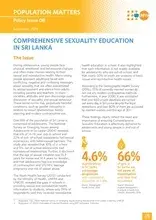The set of guidelines was adapted from the ‘Guidelines on Clinical Management of Rape Survivors' developed by the WHO in partnership with UNFPA.
In the past, much emphasis was given to the medico-legal examination, neglecting the health-related issues of the survivor. This has been given much consideration in the preparation of the new guidelines, which includes a consistent set of guidelines that takes into account health and well-being, and adheres to the principles of the rights of individuals.
After years of preparation, collaborated efforts from different sectors of the country, and numerous consolatory processes with diverse members of the medical and judicial system, the guidelines were published and launched on May 27 2014.
Sexual violence has a significant negative impact on the survivors and can adversely affect their health and well-being. This bold, new initiative is an important step for criminal investigation and healthcare in Sri Lanka. It sets a very high standard for examination of sexually abused survivors in a uniform manner, improves quality of the forensic services and healthcare, and also improves the knowledge and skills of existing healthcare workers through teaching and training.
These new national guidelines will ensure that when a sexually abused survivor comes to the criminal system, that person not only receives justice, but necessary health services. While the punishment of offenders is a priority, the guidelines place the recovery of sexually abused survivors as an essential and imperative part of the medico-legal services.
Furthermore, the guidelines will ensure the preservation of dignity of the survivors since the health is given top priority. This includes mental health and the psychological aspects of the abused survivors, which was previously not given prominence. These guidelines hope to set a precedent in taking a more holistic approach towards addressing a wider set of health issues, which has never been done before.
As UNFPA Represenative in Sri Lanka, Mr. Alain Sibenaler said: "It is crucial to avoid unnecessary referrals and visits to health institutions causing re-victimization of the already harassed person". He also added that Sri Lanka should be proud of its boldness in having guidelines of global standards on such challenging issues.
Mrs. Kamlini de Silva, Secretary of Justice commented that the new guidelines "make victim-centric care for survivors a vital obligation of the state".
It should also be noted that out of several guidelines prepared by CPFSL, this is the first guideline to have a launch, due to the national and international importance of the subject.
UNFPA was repeatedly thanked by the organizers and supporting members for their financial and technical support and also for printing 2500 forms for the collection
View the full guidelines: http://bit.ly/1iNEGEP




